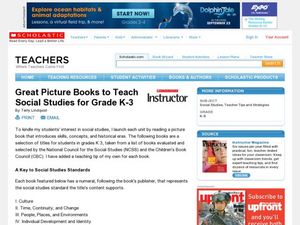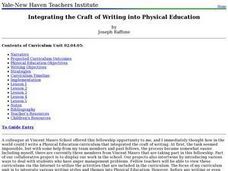Curated OER
Water Cycle Reading and Writing
Here is a great way to get pupils to express a scientific concept in a fun way. After hearing the story of Walter the Water drop and learning facts about the water cycle, the class will write a creative expository piece describing what...
Curated OER
Great Picture Books to Teach Social Studies for Grade K-3
Every class enjoys reading new books at the beginning of a unit. Use this resource to identify a variety of books for kindergarten to third grade that can be used to complement social studies standards. The books can kindle learners'...
Curated OER
The Five Classes of Vertebrates
What a terrific lesson! Learners discuss the animal kingdom, and classify them as vertebrates and invertebrates. They also identify them as fish, amphibians, reptiles, birds, and mammals. There is even a taxonomic breakdown of popular...
Curated OER
Arkansas: A Natural State
Here is a wonderful lesson plan on natural resources found in Arkansas which is designed for kindergartners. The lesson plan could be easily adapted for any state. Some clever in-class activities, games, and a song are included in this...
Curated OER
Turtle Shell Craft
Have your class learn about turtles and adaptation using this lesson. Learners discuss turtles, the unique design of their shells, and the ways they have adapted to their surroundings. Then, they make a paper bag model to simulate a...
Curated OER
Wildlife Conservation I
Focusing on the wildlife in their area, learners identify endangered and threatened species and what these animals need to survive. While this activity involves animals in the Long Island area, it could be adapted for use with any area.
Computer Science Unplugged
Ice Roads–Steiner Trees
As an introduction to Steiner Trees, class members are challenged to find the shortest paths to connect multiple points. The teacher introduces the problem by showing how to connect three points. Groups then go outside and construct a...
Curated OER
Biology of Bats
Your class will love exploring animal conservation through this lesson on bats. Learners discuss the importance of bats in the ecosystem and talk about the different types and their characteristics. As a follow up, a model of a bat or a...
Curated OER
Health - Respiration
Here is an interesting and engaging lesson plan on the lungs and the respiratory system. In it, fourth graders should gain a better understanding of how the lungs work and the role they play in supporting life. Some good, in-class...
Curated OER
Insects
It's a fact: kids love bugs! With this lesson plan, young learners explore reading informational texts and conducting research while learning about their favorite insects. Spark learners' interest by reading a book about one kind of bug...
Curated OER
Lesson Plan for "Little Red Riding Hood"
Grow young performers with storytelling. Elementary schoolers listen to the story "Little Red Riding Hood" by Mike Lockett, highlighting dialogue as they listen, and then act out the story. This is based on a story told by Mike Lockett...
Curated OER
A Model Solar System
If Earth is modeled by a grapefruit, what planet could be represented by a golf ball? This activity uses everyday and not-so-everyday objects to create a model of the Solar System.
Curated OER
Parasite Development and Life Cycle
If you are new to teaching agriculture classes, this outline may be helpful when you are preparing a lecture on parasites in livestock. In addition to lecturing on this topic, the lesson plan suggests that learners research the life...
Curated OER
Chameleons Are Cool!
Have your learners review what they know about camouflage using this lesson. Learners fill out a graphic organizer listing what they know or have questions about. This could be enhanced with the addition of a writing assignment in which...
Curated OER
Zoo Animal Experts
As part of an exploration of zoo animals, kindergarteners conduct research on their favorite animal and compile their information. Learners write about their animal in a journal and create a trading card. The culminating activity is a...
National Security Agency
Backyard Building - Area and Perimeter
Turn young mathematicians into landscape architects with this four-lesson series on area and perimeter. Beginning with a basic introduction to calculating perimeter and area using non-standard units of measurement, this instructional...
National Security Agency
Equations and Expressions
Learners demonstrate their knowledge pictorially, concretely, and abstractly in this unit meant to last three hours over three days. Using hands-on activities, manipulatives, real-world applications, and problem solving, learners write...
Curated OER
Author's Purpose
A simple activity for young readers, this introduces the idea of author purpose. Learners analyze various types of texts (newspaper articles, magazines, books, advertisements, etc.) and determine if the author's purpose for writing was...
Curated OER
Integrating the Craft of Writing into Physical Education
Incorporate writing into your physical education class. In groups, learners unscramble a list of words related to exercise and use them in their journal writings. Using their name, they write one word related to physical activity that...
Curated OER
Exploring the Hudson in 1609
Learners follow the journey of Henry Hudson down the river with his name. Using journal entries and maps, they learn about its exploration. They use maps to identify stages of the journey, and practice converting distances into miles.
Other popular searches
- Elementary Science Sound
- 5e Model Elementary Science
- Elementary Science Lessons
- Elementary Science and Soil
- Elementary Science Gravity
- Elementary Science Plants
- Elementary Science Planets
- Elementary Science Habitats
- Elementary Science Volcano
- Elementary Science Journals
- Elementary Science Heat
- Science Elementary





















